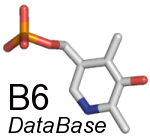|
|
| type |
Journal Article |
| authors |
Rathod, P. K.; Fellman, J. H. |
| title |
Regulation of mammalian aspartate-4-decarboxylase: its possible role in oxaloacetate and energy metabolism |
| journal |
Arch Biochem Biophys |
| Activity |
4.1.1.12 |
| ui |
85197950 |
| year |
(1985) |
| volume |
238 |
| number |
2 |
| pages |
447-51. |
| | |
|---|
| keywords |
Acetyl Coenzyme A/pharmacology |
| abstract |
A newly discovered enzyme in mammalian tissues, aspartate-4- decarboxylase (EC 4.1.1.12), catalyzes the exothermic conversion of aspartate to alanine and CO2. The occurrence of this enzyme poses at least two important questions. First, what is the purpose of such an enzyme in cell physiology? There are alternate ways to convert aspartate to alanine which are rapid and which conserve energy. Second, since the synthesis of aspartate is an energy-requiring process, how can the cell limit undue energy drain by this, seemingly pointless, beta-decarboxylation of aspartate? It is demonstrated that rat liver aspartate-4-decarboxylase is inhibited by acetyl-coenzyme A and stimulated by glutamate. These regulatory properties were predicted a priori. It was suggested that, in coordination with pyruvate carboxylase, aspartate-4-decarboxylase is important in regulating the metabolic fate of oxaloacetate and thus plays a role in determining the efficiency of carbohydrate metabolism. Furthermore, reciprocal regulation of rat liver pyruvate carboxylase and aspartate-4- decarboxylase would assure a limit on the extent of futile cycling that may occur between these enzymes. |
| last changed |
2002/11/12 16:17 |
|











